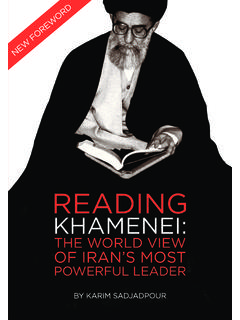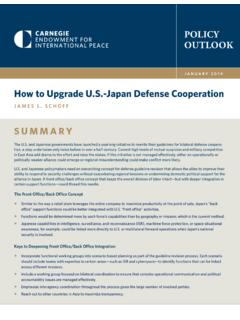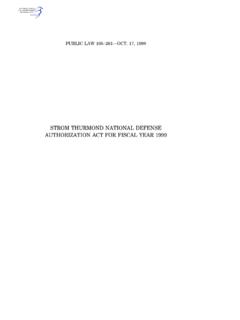Transcription of The Security Sector in Lebanon: Jurisdiction and …
1 The Security Sector in lebanon : Jurisdiction and organization Brigadier General Dr. Amine Saliba Across the world, the Security Sector has a direct effect on citizens rights and freedoms. T he legal regulation of these apparatus and the judicial oversight over their activities is the foundational measure of a country s level of democracy, a system meant to safeguard human rights and freedoms. The laws that regulate the functions of these apparatus in accordance with the Constitution must be subject to follow-up by political authorities and civil society alike. For when problems arise, they arise in the application of the law and not the content of its text. It is true that lebanon s social development and the resultant increase in crime is the main reason for the proliferation of the Security apparatus in the country, just as it is in other nations. Before lebanon s political foundation as a state, it was a forerunner in the entire region all of it under Ottoman occupation in its adoption of an internal Security force.
2 As such, on July 9, 1861, the first Security agency was founded in the Mutasarrifate, known as the Judiciary Police, through the distinguished effort of the mutassarif Daoud Pasha, who poured his modernizing energy into this agency and commissioned an English officer named Mason with training this gendarmerie, whose personnel counted 150 officers and 740 privates, tasked with maintaining Security in the Mutasarrifate. (Source: Asad Rustum, lebanon During the Mutasarrifate , Dar an-Nahar, p. 90) Since the establishment of this Security force, the sectarian make-up was taken into account from the very outset, with leadership roles assigned and recruitment of personnel considered along balanced sectarian lines. lebanon , since its founding, has always taken sectarian balance into account in the distribution of roles and acceptance of recruits within the Security forces. It should therefore come as no shock or surprise to the researcher, Lebanese or otherwise, when he or she encounters evidence of this sectarian distribution, still ongoing to this day.
3 Based on this brief historical overview, we can say that the Judiciary Police the Lebanese gendarmerie was the first Security force founded not just in lebanon (though its founding predates that of the Lebanese state), but in the entire Levant region. This gendarmerie, which subsequently became the Lebanese Internal Security Forces, upheld its unilateral grip over Security without competition until the Ottoman Empire lost the First World War and withdrew from Lebanese territory in 1918. At which point lebanon became part of the French Mandate, which quickly established Syrian-Lebanese army units in 1919, operating under the command of French officers. These units were tasked with helping the Lebanese ISF maintain order and Security . They underwent several adjustments in their organizational structures until the French withdrew from lebanon and the country gained its independence, which was subsequently followed by the establishment of the Lebanese Armed Forces on August 1, 1945.
4 This introduction establishes that the modern Lebanese state, after achieving independence, had two Security bodies in place: the Lebanese Armed Forces (LAF) and the Lebanese Internal Security Forces (ISF). From the beginning, these two bodies worked in tandem with one another to maintain both internal Security and secured borders between lebanon and its neighboring countries: Syria and Palestine. The Lebanese state then hastened to establish the Lebanese Customs Administration, which heretofore had been in the hands of the French government. Such was also the case with the Lebanese General Security , which had also been in the hands of the French. Thus the Lebanese state began the process of establishing its Security apparatus in order to keep pace with the country s social development, fight crime, maintain public order and protect people from all violations. This culminated in the establishment of the country s Security Sector , divided into the following Security agencies: I.
5 Agencies Associated with the Ministry of Defense: a) Lebanese Armed Forces and Intelligence Directorate b) The Republican Guard Brigade II. Agencies Associated with the Ministry of Interior: a) Internal Security Forces and Information Branch i) Prime Ministerial Guards Brigade ii) Parliamentary Speaker Guards Brigade b) General Directorate of General Security c) Airport Public Security Agency d) Central Directorate for Drug Control (yet to be established). (Date of establishment: General Directorate of the Internal Security Forces: the Internal Security Forces were established in 1953 by legislative decree no. 1953-59, then amended by legislative decree no. 1955-20. The General Directorate was established in 1959 during the presidency of Fouad Chehab by legislative decree no. 1959-138. Its name was fixed as it is currently known: the General Directorate of the Internal Security Forces by legislative decree no. 1967-54.
6 Note that this decree was amended during the presidency of Amin Gemayel by legislative decree no. 183-103. This amendment, however, lasted only for a few months; it was subsequently canceled, returning to existing legislative decree no. 1967-54. The agency settled on its current legislation under Law no. 17 dated 09/06/1990. As for the structure of this Directorate, it will be referred to later under the specified subheading. The Information Branch, Prime Ministerial Guards Brigade and the Parliamentary Speaker Guards Brigade were established in 1991 after the issuance of Law no. 17 and decree no. 1157 dated 05/02/1991, which regards the bureaucratic organization of the Internal Security Forces. The General Directorate of General Security was established by legislative decree no. 139 dated 06/12/1959 under the presidency of Fouad Chehab. It was subsequently amended by legislative decree no. 104 dated 09/16/1983, and then canceled by decree no.
7 27 dated 03/23/1985, with work resuming according to the content of existing decree no. 139. The organizational structure of the General Directorate of General Security was established by decree no. 2873 dated 12/16/1959 and is made up of the following departments: 1. The Central Administration, headed by the Director of General Security and overseeing the following sub-departments: - The Secretariat - A dministrative Department - Department of Investigations - Department of Foreigners Affairs - Department of Residency (permit) Regulations 2. The General Security Department Pertaining to Areas Including the Airport, Port and Land Borders That the entirety of the General Security is in accordance with decree no. 2571, dated 08/08/1992, with its amendments that affect 7,000 officers, NCOs and privates.) III: Agencies (Indirectly) Related to the Presidency of the Republic. a) General Directorate of State Security The operational activities on the ground and their implications for the freedom and Security of citizens will be the subject of this research, which will focus on the negative impact on the rights and freedoms of the citizen.
8 It will not address the regulations of these apparatus from a legal standpoint because this will be the subject of another research. (As far as this point is concerned, I believe that the profile included above, about the General Security , and the organizational structure of the Internal Security Forces in the coming pages, should suffice. Should there be a need for more details, I can arrange for a copy of the laws and decrees that serve to regulate the activities of these Security agencies and include it as an appendix that can be consulted for more information on their operations.) Our goal in this research is to shed light on the adverse effects arising from the legal regulations and the loopholes contained therein, for if we do not attempt to close these legal loopholes and emerge with a new understanding of how to strengthen the performance of these Security agencies, then all attempts to improve their work and to elevate the standards of human rights and freedoms to the level aspired to by the international community and civil society will have been in vain.
9 To that end, this first part will present a breakdown of the operational activities of each of these agencies forming the Security apparatus from the perspective of their legal regulation. This is in order to point to the overlap in duties and lack of on-the-ground coordination that sometimes occurs, resulting in poor performance and lack of concrete result. It is also in order to reveal the obstacles and their resulting negative impacts, particularly how they affect human rights in lebanon . This will allow us, in the second part of this research, to enumerate the recommendations necessary to improve the performance of the Security Sector in lebanon and to advance the performance of these agencies or what will remain of them after overhaul to a level in line with what is envisioned by civil society in lebanon , and supported by the democratic nations of the free world. Before getting into the details, it is helpful here to pause and think on the content of the Carnegie research paper from 10/17/2009, produced by senior associate Yezid Sayegh and entitled: Restoring Broken Windows, in the Security Sector in [.]
10 ] and lebanon [..]. The study focuses on a structural comparison of the various agencies of the Security Sector in lebanon and the Sector s successes in repairing its most obvious gaps. But we must set aside this study, along with similar studies, carried out by other experts and specialists, in order to visualize a possibility beyond a framework that uses the metaphor of a broken window in need of repair to describe the Security Sector in lebanon . Our goal must be to overhaul the entire Sector , transforming it into a window made of solid steel, able to withstand any shock without breaking and able to control the Security situation in accord with the higher good of the state while taking into account the issues of human rights and freedoms. The Current Operations Ongoing in the Security Sector I. The Agencies Related to the Ministry of Defense 1. The Lebanese Armed Forces There is no doubt that the Lebanese Army, like all the armies in the countries of the world, is considered the most important line of defense when it comes to safeguarding civil and general peace, especially when the Security situation poses challenges that overstep the abilities and energies of all branches of the internal Security forces.








